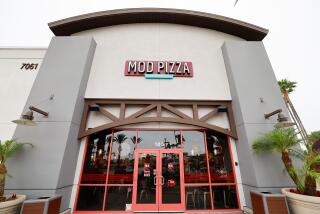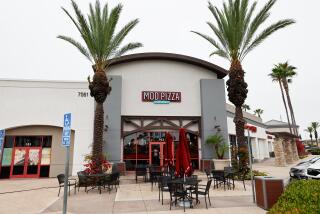Domino’s Owner May Sell Chain : Tom Monaghan, who has been called the Malcolm Forbes of the Midwest, is considering devoting his life to charity.
- Share via
DETROIT — Tom Monaghan, the eccentric, rags-to-riches story who founded and remains sole owner of the huge Domino’s Pizza chain, startled observers over the weekend by announcing that he is thinking about selling the Ann Arbor, Mich.-based company to devote his life to charity.
Monaghan, who started with $500 and a single storefront pizza joint in Ypsilanti, Mich., in 1960 and turned it into the world’s largest pizza delivery chain, with annual sales of $2.3 billion, has been roundly criticized in the past for his ostentatious displays of wealth.
But now, in a dramatic twist, the 52-year-old Monaghan--who has previously expressed frustration with criticism of his opulent life style--reportedly wants to devote his life to charities operated by the Catholic Church.
Among other charities, Monaghan currently supports a Catholic mission in Honduras and has set up a Domino’s outlet in that Central American country to help provide jobs there. Monaghan has founded the Domino’s Foundation to finance his personal charitable activities.
Monaghan, who has described himself as a devout Catholic, couldn’t be reached for comment Monday. But in a letter to Domino’s employees and franchise holders obtained by the Ann Arbor News, he wrote: “I am in a position to help various charities that I deeply believe in. I have discovered that this is a very big job and it is not fair to give divided attention to Domino’s Pizza and my (charitable) work.”
Domino’s spokesman Ron Hingst confirmed Monday that Monaghan is exploring the possibility of selling Domino’s, both to spend more time on charitable activities and also to clarify the status of his personal estate. The Domino’s empire is actually owned by Monaghan’s personal holding company, TISM Inc.
The idea that Monaghan would turn away from the business world to help the less fortunate is all the more surprising given his record as an acquisitive man unafraid of throwing his money around.
A college dropout who spent his youth shuttling between orphanages and foster homes, Monaghan has used the riches generated by Domino’s to buy many of the worldly goods that he fantasized about as a poor boy.
In recent years he’s been on a wild shopping spree that has led some local wags to describe him as the Malcolm Forbes of the Midwest. Among many other things, he now owns the Detroit Tigers baseball team, the world’s largest collection of Frank Lloyd Wright-designed homes and furnishings and one of the nation’s most valuable fleets of antique automobiles. In 1986, he paid $8.1 million for a single car--a 1931 Bugatti Royale--then the highest price ever paid for an automobile.
Has His Heroes
“I have the same kind of fun Malcolm Forbes has,” Monaghan acknowledged in a 1987 interview with The Times.
Yet Monaghan also has suggested in the past that he has something of a split personality, and that he has never been completely comfortable with the vast wealth he has so quickly accumulated. In his 1986 autobiography, he indicated that he is a man who has struggled in his own mind to balance his competing thirsts for material wealth and spiritual well-being.
“Bill Veeck (the late owner of the Chicago White Sox) and P. T. Barnum are heroes of my flamboyant side,” Monaghan wrote. “At the same time, men like Pope John and Abraham Lincoln appeal to my strait-laced standards.”
Added Hingst, in all seriousness: “He talks now about how his heroes today are Mother Teresa and Donald J. Trump.”
One of the best examples of that dual nature came in 1987, when he invited a group of nuns of the Felician order to join him to watch a Tigers game--from his private luxury box just behind home plate.
In June, Monaghan turned over responsibilities for the daily operations at Domino’s to President Dave Black, saying he needed to devote more time to his outside interests. But he retained sole ownership of the company and never indicated that he wanted to sell it. He has told reporters that he once rejected an offer to sell Domino’s to PepsiCo.’s Pizza Hut subsidiary. He has also frequently vowed not to take the company public because he could never stand having outside shareholders tell him what to do.
Since it has always been privately held, industry analysts said they are uncertain what price Domino’s could fetch on the open market.
Guarantee an Issue
The fact that two-thirds of its delivery outlets are held by franchisees and only one-third are company-owned could reduce the price, said Joseph Doyle, a food and beverage industry analyst with Smith Barney, Harris Upham. With corporate-only sales estimated at just over $1 billion and earnings of about $62 million in 1988, Doyle estimated that the company might be worth only about $700 million.
Still, Domino’s, which had just 100 stores as recently as 1976, has become an American institution almost overnight. With 5,100 outlets and 180,000 employees worldwide, its red, white and blue storefronts are now almost as common a sight on the fast-food landscape as the golden arches of McDonald’s.
Domino’s has so many delivery drivers around the nation that some critics say they have become a menace on the highways. Earlier this summer, the mother of a Domino’s driver killed while delivering a pizza in Indianapolis produced a video asking Domino’s franchise holders to consider the hazards their drivers face while trying to meet the company’s 30-minute delivery guarantee.
But that guarantee has been the secret of the company’s success. The company grew so rapidly because it offered something no one else ever had--home delivery of pizza backed up by national standards for service and quality and a guarantee of delivery within 30 minutes. During the 1980s, Domino’s pushed aside hundreds of mom-and-pop delivery operations in every new market it entered, and it now controls roughly 60% of the pizza delivery market. It is second only to Pizza Hut in total pizza sales and holds between 14% and 16% of the total market, according to Hingst.
More to Read
Inside the business of entertainment
The Wide Shot brings you news, analysis and insights on everything from streaming wars to production — and what it all means for the future.
You may occasionally receive promotional content from the Los Angeles Times.










